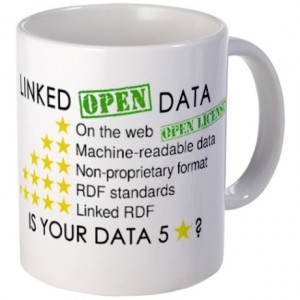There has been a noticeable increase in news about Open Data (news that is more substantial than my last post on running data). Putting data on the Web in standard formats promises to spur innovation, commerce, cures for diseases, transparency, accountability and collaboration around the world. Linked Open Data takes this a step further, leveraging the power of linking, which is central to the Web of documents, to connect data across the Web like a large, distributed relational database.
See video: Linked Open Data – What is it? (from Europeana)
Read on for pointers to initiatives at the Open Data Institute, TED, Web Foundation, Orange and the US Gov’t …
The Open Data Institute was recently launched under a 10 million GBP grant from the British government. Congrats to old friends Tim Berners-Lee and Nigel Shadbolt getting the much needed support for work on this important topic. Their words: “Our vision is to demonstrate the endless business opportunities created through the utilisation of Open Data. We aim to nurture and mentor new businesses exploiting Open Data for economic growth.” Great stuff. Best wishes for success!
Another old friend, John Wilbanks, gave a talk at TED Global this year, entitled, Let’s Pool our Medical Data, and it was recently posted. John ponders whether our need for privacy is slowing research, and whether making more of our medical data openly available might lead to discoveries that attack our most pressing medical needs.
OK, one last old friend plug: Josema Alonso and colleagues in the Web Foundation family have been leading the charge in introducing open data methods and benefits in developing countries. Check out reports from the Open Data Bootcamp in Ghana, new Ford Foundation funded work in Indonesia, and their Open Data South project with IDRC and the Berkman Center. I attended a very interesting meeting on the latter last month at Berkman.
The French HQ-ed mobile company Orange is running the “D4D (Data for Development) Challenge“- making available the largest ever released dataset on mobile phones and usage. They are making available data from calls across the Ivory Coast during a 5 month[ period (Dec 2011 to Apr 2012), containing 2.5 billion calls and text messages exchanged between 5 million anonymized users. They invite creative people to explore the data and propose methods that help the world to understanding better typical behaviors could be useful to, for example, identify early signs of epidemics, how to respond in times of crisis, how to measure the threat and resultant impact of droughts, how to optimize the usage of certain infrastructures, etc.
Opening of US government data has been instrumental in stimulating discovery, commerce and innovations that benefit society. Think of GPS and weather data. The US White House Office of Science and Technology Policy recently announce their new initiatives under the heading of, “Fueling American Entrepreneurship With Open Data”. They have initiatives underway around energy, safety, education, health and other topics. They fun hackathons, contests and other opportunities.
I’m increasingly interested in applying linked open data technologies to the “Internet of Things” - the growing system of products and services identified by tags based on bar code, QR code and RFID technologies. Keep an eye on this space.


Leave a Reply
You must be logged in to post a comment.